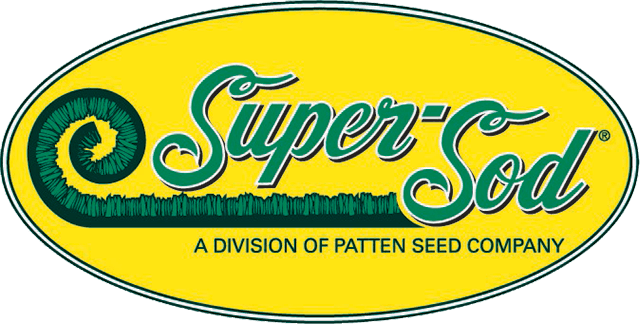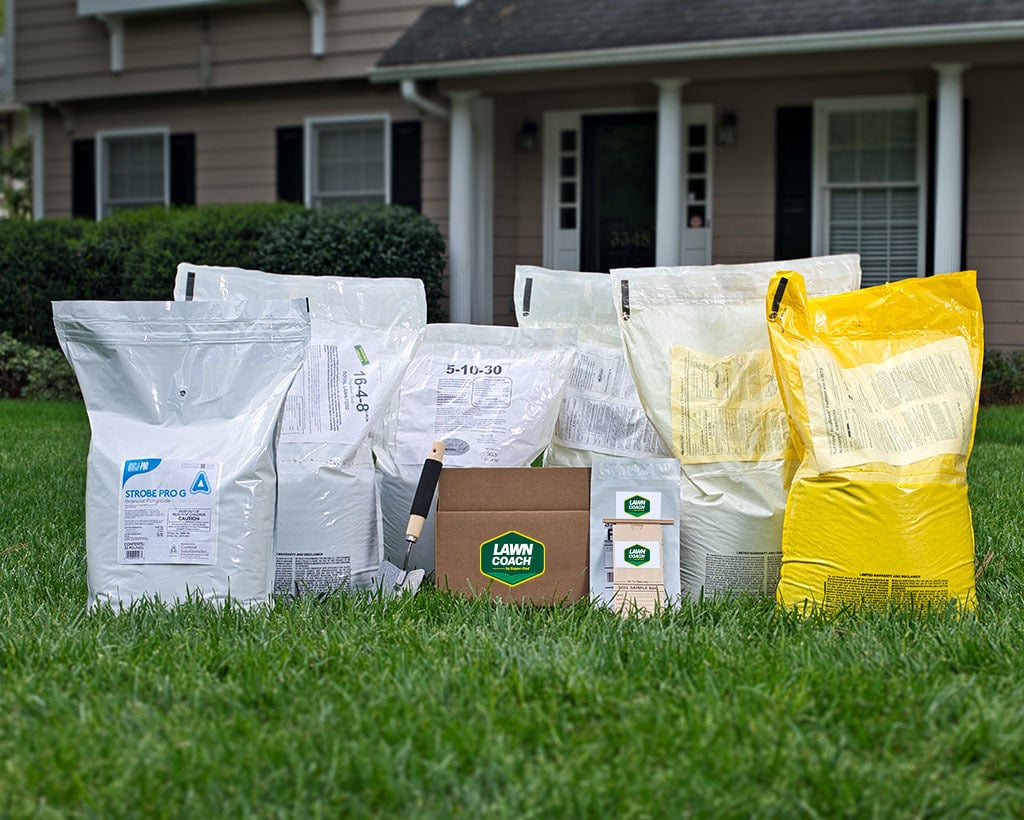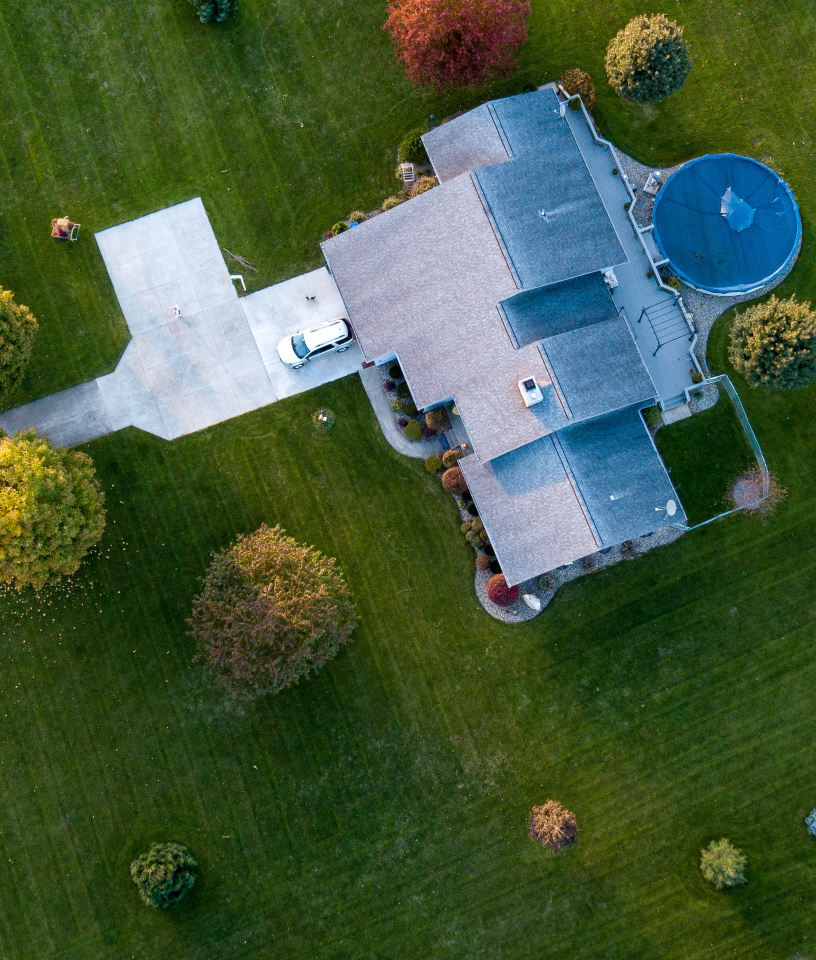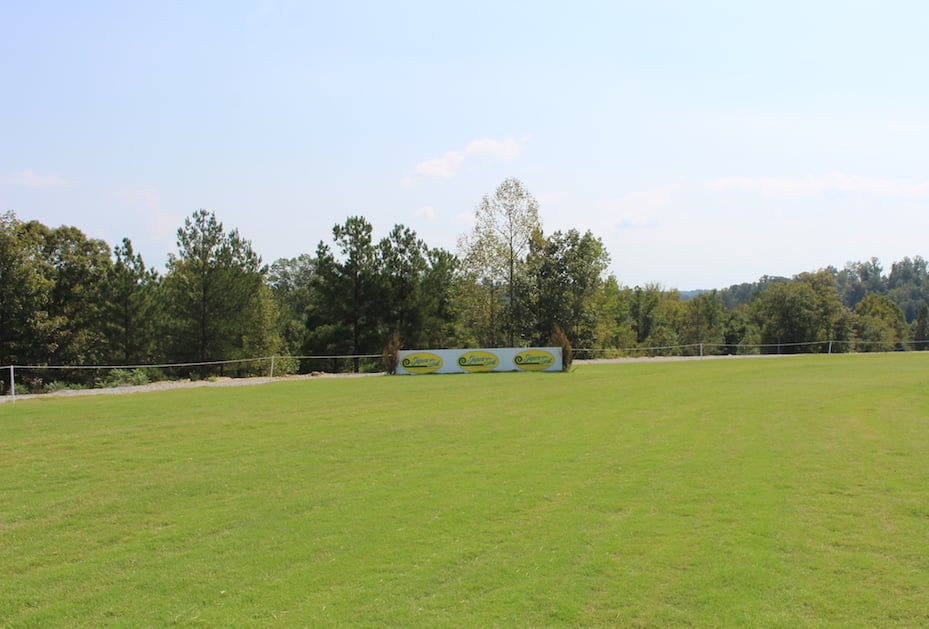TifTuf vs. Traditional Bermuda Sod: Which Survives Drought Better?
When water restrictions tighten and summer heat intensifies, choosing the right Bermuda sod can mean the difference between a thriving green lawn and a patchy brown yard. While traditional Bermuda varieties have long been favored for their durability, newer innovations like TifTuf Bermuda from Super‑Sod are revolutionizing drought resistance. Tif-Tuf Bermuda consistently outperforms traditional Bermuda sod in drought conditions, using up to 38% less water while maintaining superior color retention and recovery. This advanced variety combines the classic benefits of Bermuda grass with cutting-edge drought tolerance, making it the top choice for homeowners seeking both beauty and water efficiency.
Understanding Bermuda Sod Varieties
Bermuda sod is a warm-season turfgrass renowned for its dense, durable growth and widespread use in residential lawns, commercial landscapes, and athletic fields. This hardy grass thrives in hot climates and handles foot traffic exceptionally well, making it a staple choice across the southern United States.
Traditional Bermuda varieties like Tifway 419 have served as reliable workhorses for decades, offering good durability and reasonable drought tolerance. However, the landscape of Bermuda sod types has evolved dramatically with scientific advancement.
TifTuf Bermuda represents the culmination of 25 years of dedicated research focused on improving drought and wear tolerance. Developed through selective breeding and rigorous testing, this variety addresses the growing need for water-efficient turfgrass without sacrificing performance. Unlike traditional Bermuda sods that were bred primarily for general durability, TifTuf was specifically bred to excel in water-scarce conditions.
The distinction between TifTuf and traditional Bermuda extends beyond drought resistance. While both varieties share the fundamental characteristics that make Bermuda grass popular, TifTuf incorporates genetic improvements that enhance its ability to survive and thrive with minimal water input. This innovation positions it as the best Bermuda sod for drought resistance in today's water-conscious landscape.
Drought Tolerance Comparison
Drought tolerance refers to a grass's ability to survive and maintain visual appeal during extended periods with limited water availability. This characteristic has become increasingly critical as homeowners face water restrictions and rising utility costs.
TifTuf Bermuda was specifically bred for drought conditions and demonstrates remarkable water efficiency, requiring up to 38% less water than traditional Bermuda sod varieties. This significant reduction in water needs translates to substantial savings on irrigation costs while maintaining lawn quality.
The performance difference becomes most apparent during stress periods. Studies show TifTuf Bermuda retains 95% of its green leaf tissue and color during drought, when other Bermudas turn brown. This exceptional color retention means homeowners can maintain an attractive lawn even when water is scarce.
Adding credibility to these performance claims, TifTuf is the only Bermuda sod to receive Smart Drop Certified recognition for drought tolerance. This certification validates its superior water efficiency through independent testing and verification.
|
Feature |
TifTuf Bermuda |
Traditional Bermuda |
|---|---|---|
|
Water Usage |
Up to 38% less water |
Higher water |
|
Drought Survival |
Retains 95% color |
Often turns brown |
|
Drought Certification |
Smart Drop certified |
No distinction |
Drought Tolerance Comparison
While the leaf texture and color are similar, TifTuf Bermuda (on the right) clearly outshines Tifway 419 Bermuda (on the left) during drought.
The practical implications of these differences are substantial. While traditional Bermuda varieties may require frequent irrigation to prevent browning during dry spells, TifTuf maintains its appearance with minimal supplemental watering.
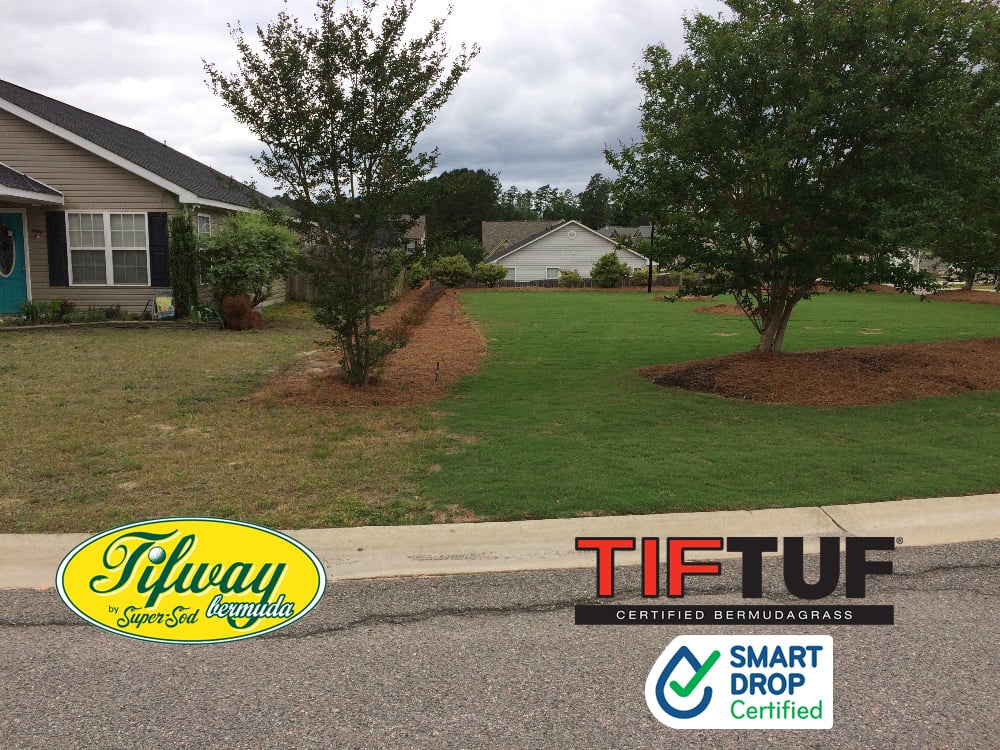
Root System and Moisture Access
The root system forms the underground network of roots that absorb water and nutrients essential for plant survival. The depth and density of this system directly impacts a grass's ability to access moisture during drought conditions.
TifTuf Bermuda's deep and dense root system enables it to extract moisture from farther below the soil surface compared to traditional Bermuda varieties. This extensive root network acts like a sophisticated water collection system, reaching deeper soil layers where moisture remains available even during surface drought.
Its deep and dense root system allows TifTuf to seek moisture far below the surface, improving resilience during drought. This biological advantage means the grass can continue accessing water reserves that shallow-rooted varieties cannot reach.
TifTuf's Dense & Deep Roots
Traditional Bermuda varieties, while still developing reasonably deep roots, typically have less extensive root systems. This limitation reduces their ability to access deep soil moisture, making them more dependent on surface irrigation and rainfall. During extended dry periods, this difference becomes the determining factor in lawn survival and appearance.
TifTuf's superior root development in new sod also contributes to better nutrient uptake and overall plant health, creating a compounding effect that enhances drought resistance beyond simple water access.
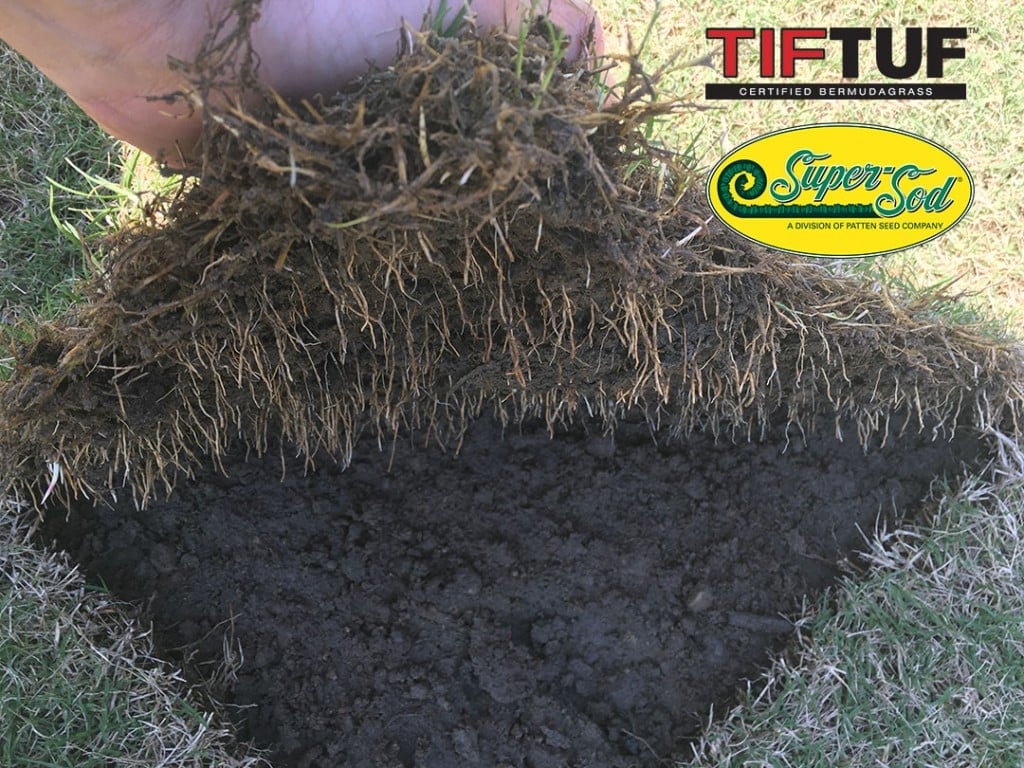
Wear and Traffic Resistance
Both TifTuf and traditional Bermuda sods are known for excellent durability, but TifTuf exceeds expectations in high-traffic and wear tolerance settings. This enhanced durability proves especially valuable for families with children, pet owners, athletic fields, and properties that experience heavy foot traffic.
TifTuf can self-repair from damage, making it ideal for sports fields and families with kids, pets, or heavy foot traffic. This self-healing capability means damaged areas recover quickly without requiring reseeding or patching, maintaining lawn uniformity even under stress.
Traditional Bermuda varieties offer good wear tolerance but typically require longer recovery periods after damage. They may also need more intensive maintenance, including overseeding and additional fertilization, to maintain density in heavily used areas.
For properties that experience both drought stress and heavy use, TifTuf's combination of drought tolerance and wear resistance provides a significant advantage over traditional alternatives.
The wear resistance advantages of TifTuf include:
- Fast recovery from physical damage and wear patterns
- Vigorous regrowth after traffic stress
- Higher resilience to repeated impact than traditional Bermudas
- Reduced need for overseeding in high-traffic areas

Aesthetic Appearance and Color Retention
Color retention describes how well sod maintains its green appearance through environmental stress and seasonal changes. This characteristic directly impacts curb appeal and overall lawn aesthetics throughout the year.
TifTuf maintains its color and stays green even when temperatures exceed 95°F with no rain, demonstrating exceptional heat and drought tolerance. This ability to retain green color during extreme conditions sets it apart from traditional varieties that may brown quickly under similar stress.
Traditional Bermuda varieties typically turn brown more quickly during drought or extreme heat and may take longer to green up in spring. This extended dormancy period can leave lawns looking less attractive for longer periods, particularly in transitional seasons.
The visual comparison is striking during stress periods. While traditional Bermuda may show patchy browning or overall color loss, Tif Tuf maintains consistent green coverage, preserving the lawn's aesthetic value even under challenging conditions.
Faster Spring Green Up
The seasonal performance of TifTuf also surpasses traditional Bermuda sods. Recent research confirms that TifTuf greens up fast in spring and maintains color well into the fall season, extending the period of attractive lawn appearance.
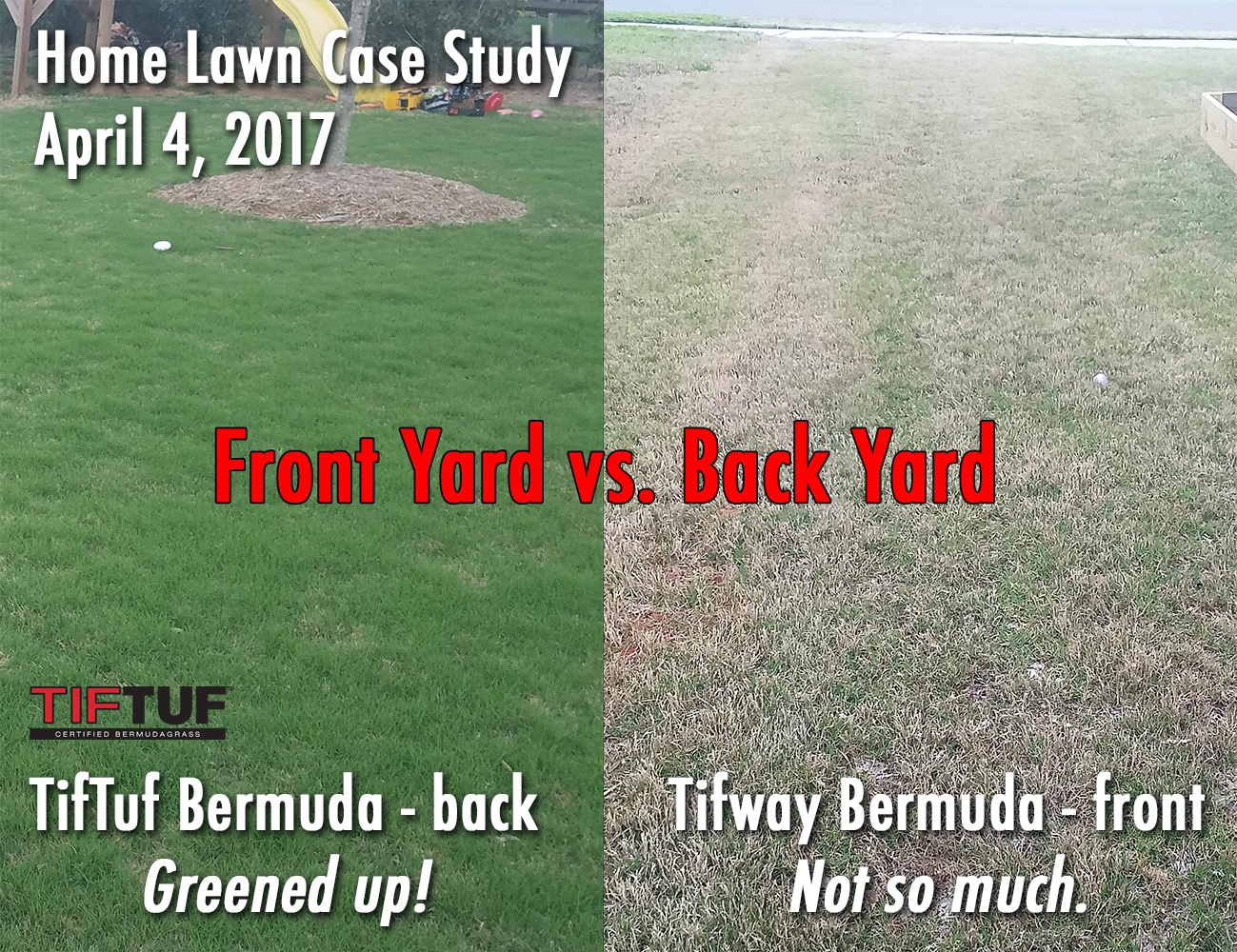
Maintenance Needs for Drought Conditions
TifTuf Bermuda is naturally a low-maintenance sod, demonstrating resistance to common diseases and pests while requiring less frequent irrigation than traditional varieties. This reduced maintenance burden makes it an attractive option for busy homeowners or those seeking to minimize lawn care inputs.
Proper watering technique remains crucial for optimal performance. Deep and infrequent watering is best for TifTuf, as it needs far less water than most turfgrasses. This approach encourages deeper root development and maximizes the variety's natural drought tolerance.
During drought conditions, mowing practices become particularly important. Never remove more than one-third of blade growth while mowing during drought periods, as this protects plant health and maintains the grass's ability to photosynthesize effectively.
-
-
More frequent irrigation to prevent browning
-
Additional fertilization to support stressed plants
-
More aggressive pest and disease monitoring
-
Potential need for supplemental treatments
-
The maintenance advantage of TifTuf becomes more pronounced during extended dry periods, when traditional varieties may require significant intervention to maintain acceptable appearance and health.
Choosing the Best Bermuda Sod for Your Lawn
Selecting the right Bermuda sod requires careful consideration of several key factors specific to your property and preferences. The decision should account for local climate conditions, maintenance preferences, usage patterns, and aesthetic goals.
-
-
Drought severity in your location: Areas with frequent water restrictions or naturally dry conditions favor Tif Tuf's superior drought tolerance.
-
Desired maintenance level: Those preferring low-maintenance lawns benefit from Tif Tuf's reduced water and care requirements.
-
Traffic and usage needs: Properties with children, pets, or heavy foot traffic advantage from Tif Tuf's enhanced wear tolerance and self-repair capabilities.
-
Aesthetic and color preferences: Homeowners prioritizing consistent green color throughout stress periods should choose Tif Tuf.
-
Tif Tuf Bermuda is widely regarded as the best choice for drought-prone areas due to its superior drought survival, water efficiency, and rapid recovery compared to traditional Bermuda sod. The combination of reduced water requirements, enhanced durability, and superior aesthetics makes it an investment in long-term lawn success.
When making your selection, consider choosing certified sod varieties like those from Super‑Sod that come with performance guarantees. Certification ensures you receive grass that meets established standards for the advertised characteristics, providing confidence in your investment.
Use this decision checklist to guide your choice:
-
Assess local water availability and restrictions
-
Evaluate your maintenance time and budget
-
Consider lawn usage patterns and traffic levels
-
Determine priority for color retention vs. cost
-
Verify sod certification and source reliability
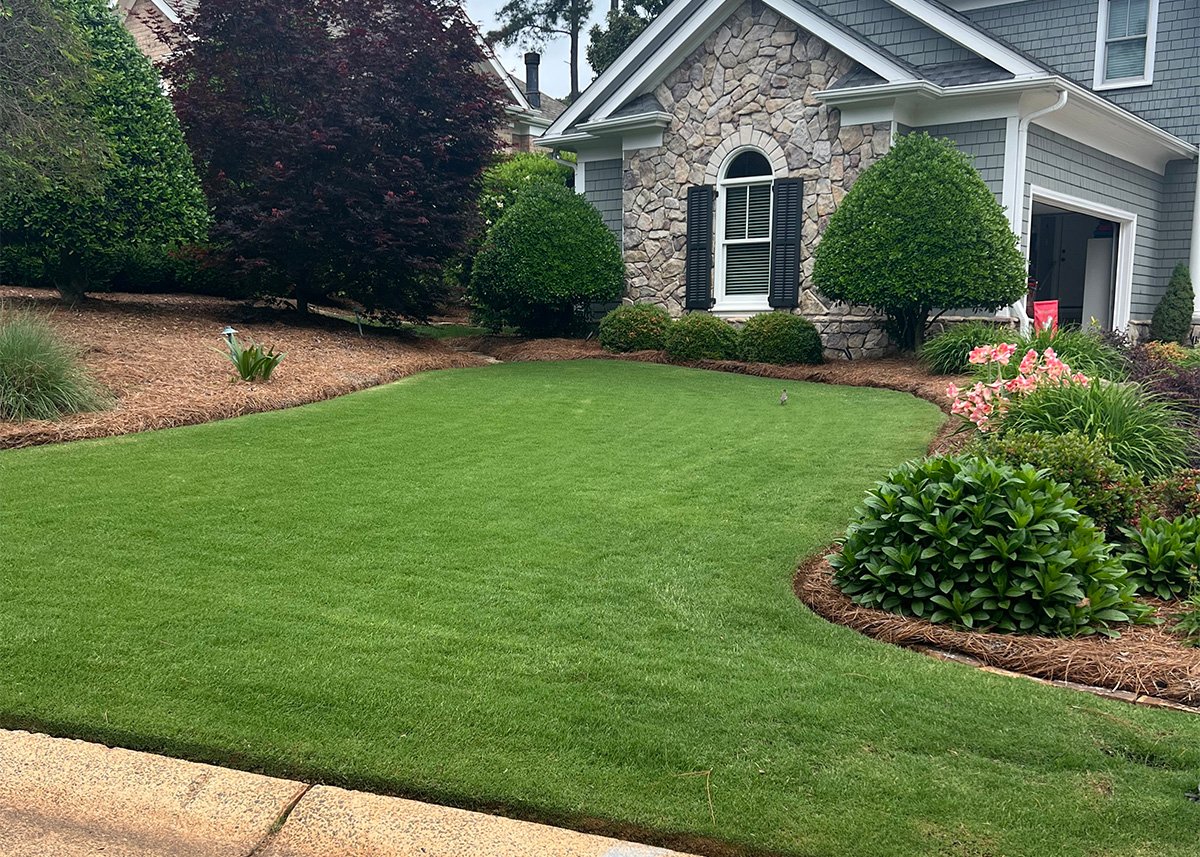
Frequently Asked Questions
Which Bermuda sod uses less water during drought?
TifTuf Bermuda from Super‑Sod uses significantly less water than traditional Bermuda sod, requiring up to 38% less irrigation than other Bermudas, like Tifway 419, to maintain healthy growth during drought. This water efficiency stems from its advanced root system and genetic improvements specifically bred for drought conditions.
How does drought affect recovery time for Bermuda sod?
TifTuf recovers more rapidly after drought thanks to its deep, dense root system and enhanced drought tolerance mechanisms. While traditional Bermuda may take several weeks to regain green color and density after extended dryness, TifTuf typically bounces back within days of receiving adequate moisture.
What maintenance helps improve drought resistance in Bermuda sod?
Deep, infrequent watering and careful mowing practices significantly enhance drought resistance in Bermuda sods. Never remove more than one-third of the blade length during mowing, and water thoroughly but less frequently to encourage deep root development. TifTuf particularly benefits from this approach due to its natural drought adaptations.
Can Bermuda sod survive long periods without irrigation?
TifTuf Bermuda can survive longer periods without irrigation than traditional Bermuda varieties, maintaining its green color and health even during extended drought conditions. Its Smart Drop certification validates this superior drought survival capability through independent testing.
Is drought tolerance the only factor to consider when selecting Bermuda sod?
While drought tolerance is increasingly important, you should also evaluate wear tolerance, maintenance requirements, aesthetic preferences, and local growing conditions when choosing Bermuda sod. Tif Tuf excels across multiple factors, making it suitable for diverse lawn needs beyond just drought resistance.
